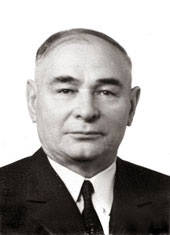Awerki Borissowitsch Aristow
Averky Aristov ( Russian Аверкий Борисович Аристов ; born October 22, jul. / 4. November 1903 greg. In Krasny Yar , Governorate Astrakhan, Russian Empire , now Astrakhan Oblast , Russia ; † 11. July 1973 in Vienna ) was a Soviet politician and Diplomat.
Life
Early years
Aristow, son of a fisherman, worked as a fisherman from 1912 to 1919. In 1919 he became a member of the Komsomol and in 1921 a member of the Communist Party of the Soviet Union (CPSU). He participates in the establishment of the Russian Communist Youth Association. In 1922 he was secretary in the Komsomol district committee of the Astrakhan governorate. He studied in Astrakhan and Kazan from 1922 to 1925 . From 1925 to 1926 he served in the Red Army and was party secretary of a regiment. From 1927 on, he first worked in the Astrakhan District Committee for Propaganda and Organization. From 1928 to 1932 he studied again, now at the Polytechnic Institute in Leningrad , became a metallurgical engineer and he worked in the Centrolit factory in Leningrad. From 1934 he was a lecturer for scientific and pedagogical questions at the Industrial Institute in Leningrad, later at the Kirov Industrial Institute in Sverdlovsk .
Ascent
In 1940, after the Stalinist purges , Aristov's ascent continued rapidly: from 1940 to 1943 as secretary of the Communist Party Area Committee Sverdlovsk , 1943 to 1944 as secretary of the Communist Party Area Committee in Kemerovo , and from 1944 to 1950 as first secretary of the Communist Party Committee of Krasnoyarsk and 1950 to 1952 as first secretary of the Chelyabinsk Communist Party Area Committee . From 1946 to 1962 he was also a deputy in the Supreme Soviet of the USSR .
At the center of power
It was followed by his rise to the center of power of the party. In 1952 he became a member of the Central Committee of the CPSU and from 1952 to 1953 he was secretary of the Central Committee and at the same time a full member of the highest political body of the USSR, the Presidium (previously Politburo ) of the Communist Party of the Soviet Union (CPSU). The presidium was considerably enlarged by Stalin in 1952 from 12 to 24 members and reduced to eight members after his death. As a result of this reduction, Aristov initially lost his membership in the presidium.
1953 to 1955 he was active in the party leadership of Krai Khabarovsk . He was then again from July 12, 1955 to May 4, 1960 secretary of the Central Committee of the CPSU and from 1957 to 1961 again a full member of the Presidium . During this phase he largely supported Nikita Khrushchev in his efforts to de-Stalinize . He also had to negotiate with the Communist Party leadership during the crisis in the CSSR in Prague in 1957 . In the Presidium, he was otherwise responsible for agricultural issues.
Loss of power
In 1960 he lost his post as Central Committee secretary to what it was said to "concentrate" on his duties in the office of the Central Committee for the Affairs of the Russian SFSR . He lost this task, now in disgrace, in 1961 to the new presidium member Gennady Voronov . It was the time when Leonid Brezhnev increasingly asserted himself in the Presidium. The deficiencies in agriculture, which Aristov was also charged with, and a general desire of the party leadership for personnel changes (rules of 1960 for the renewal of the leadership) led to his political disempowerment.
He became ambassador to Poland from February 1961 and lost on the XXII. Party Congress of the CPSU in October 1961 finally his membership in the Presidium of the Central Committee.
In 1971 he became ambassador to Austria, where he died in office in 1973.
He was buried in the Novodevichy Cemetery in Moscow.
Honors
He received
- the Order of Lenin , three times
- the Order of the Red Banner of Labor , three times
- the Order of the Red Star
literature
- Michel Tatu: Power and Powerlessness in the Kremlin , Edition Grasset and Ullstein, 1967 and 1968, Paris and Frankfurt / M
- Merle Fainsod : How Russia is governed ; Kiepenheuer & Witsch, 1965
- Wolfgang Leonhard : Khrushchev's great cleansing in the world v. February 24, 1961 from Open Society Archives - OSA
- Awerkij B. Aristow , in: Internationales Biographisches Archiv 32/1973 of July 30, 1973, in the Munzinger archive ( beginning of article freely accessible)
Web links
- Article Awerki Borissowitsch Aristow in the Great Soviet Encyclopedia (BSE) , 3rd edition 1969–1978 (Russian)
- Biography , Vecherny Chelyabinsk (Вечерний Челябинск)
- Averky Borisovich Aristov in the database of Find a Grave (English)
| predecessor | Office | successor |
|---|---|---|
| Pyotr Andreyevich Abrassimov |
Soviet ambassador to Poland 1961–1971 |
Stanislav Antonovich Pilotovich |
| Boris Fyodorovich Podzerov |
Soviet ambassador to Austria 1971–1973 |
Mikhail Timofejewitsch Eefremov |
| personal data | |
|---|---|
| SURNAME | Aristow, Awerki Borissowitsch |
| ALTERNATIVE NAMES | Аристов, Аверкий Борисович (Russian) |
| BRIEF DESCRIPTION | Soviet politician and diplomat |
| DATE OF BIRTH | November 4, 1903 |
| PLACE OF BIRTH | Krasny Yar , Astrakhan Governorate, Russian Empire , today Astrakhan Oblast , Russia |
| DATE OF DEATH | July 11, 1973 |
| Place of death | Vienna |
